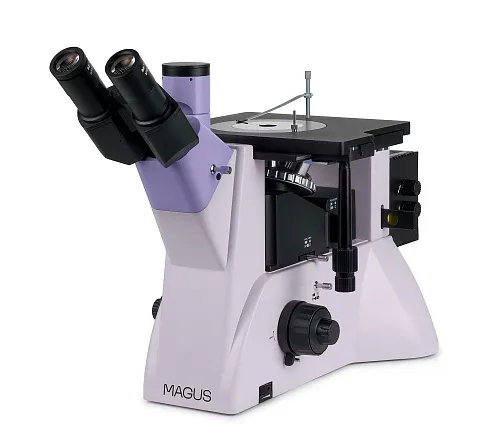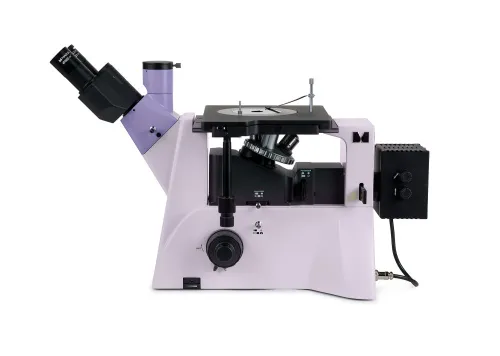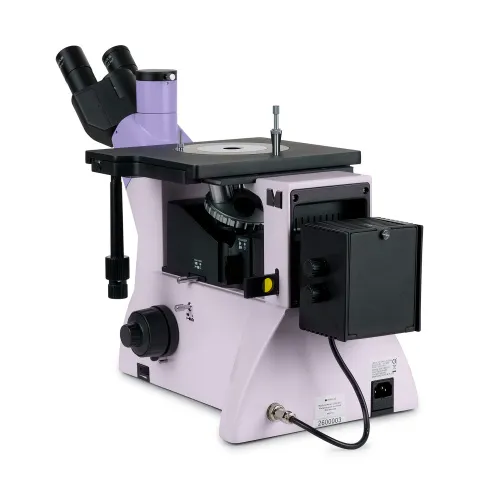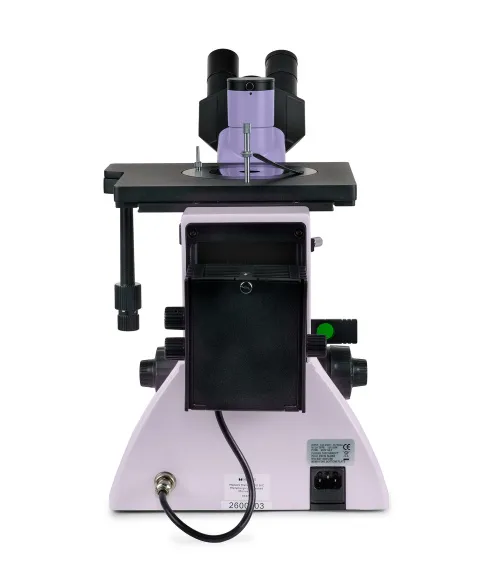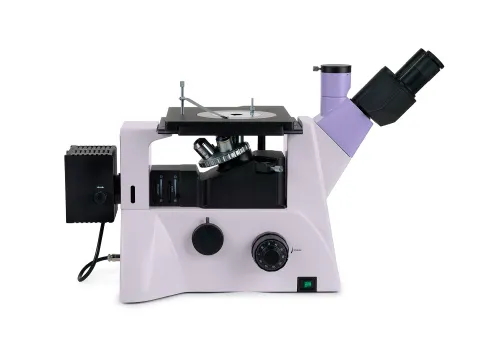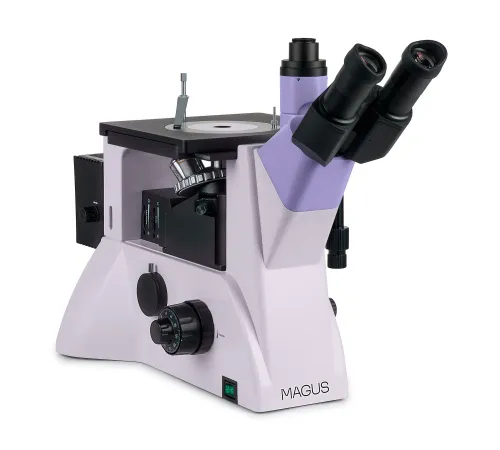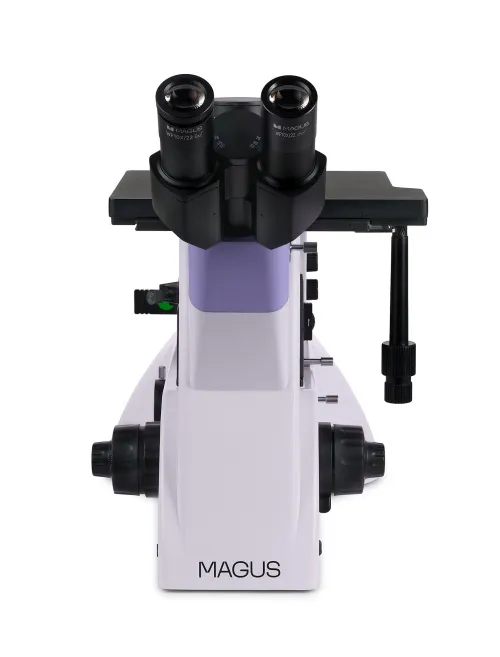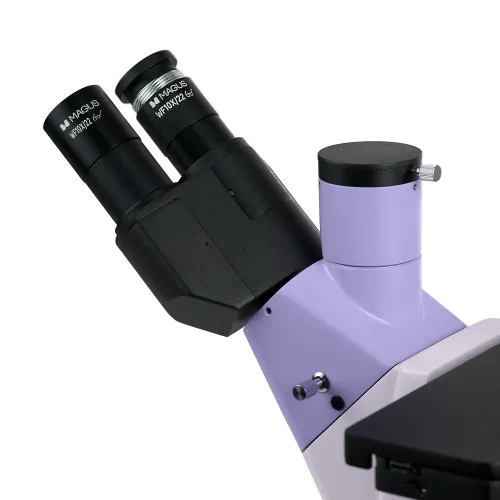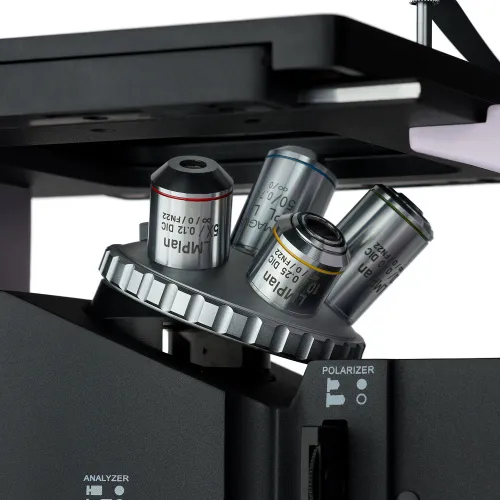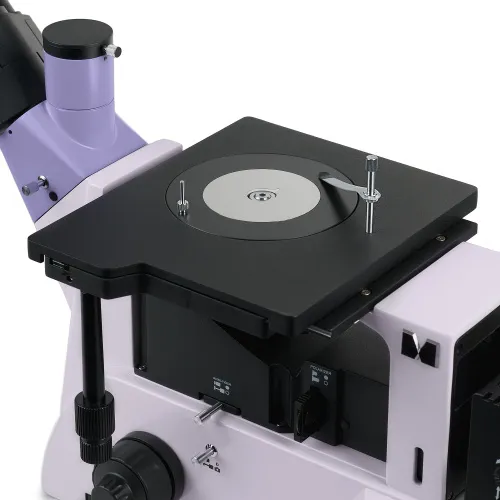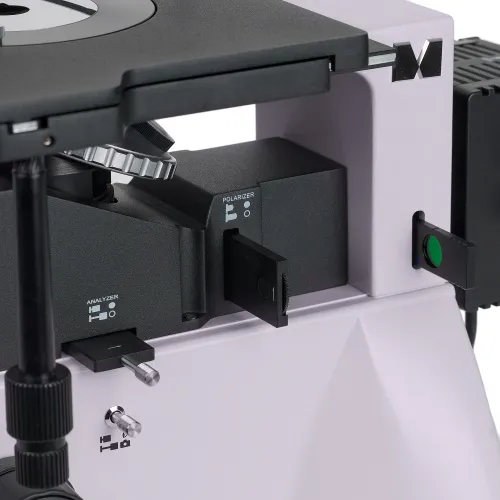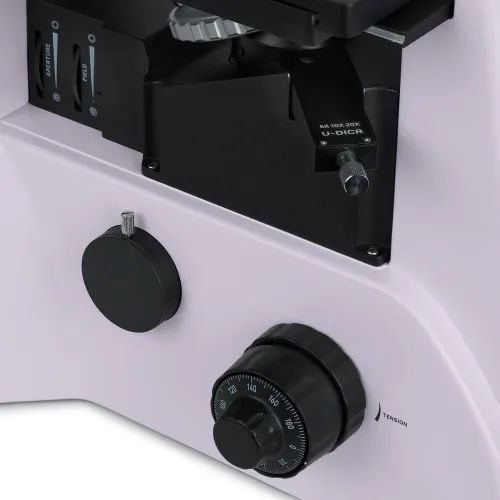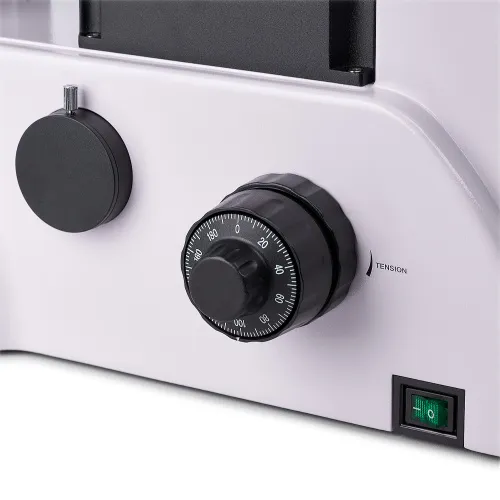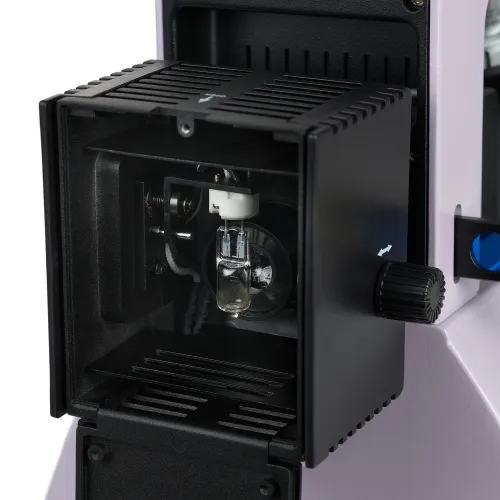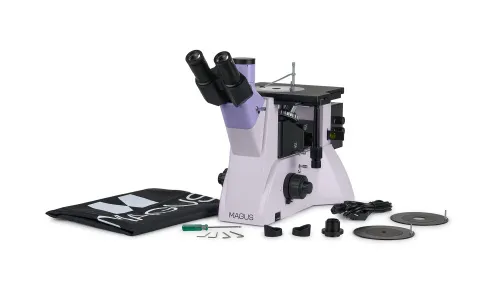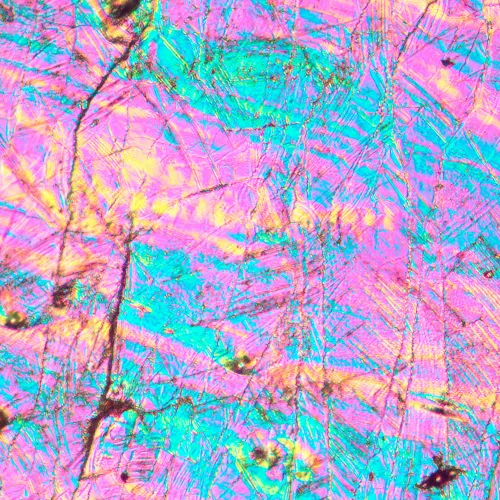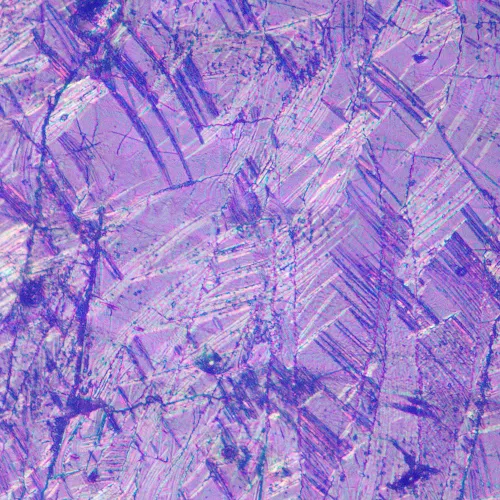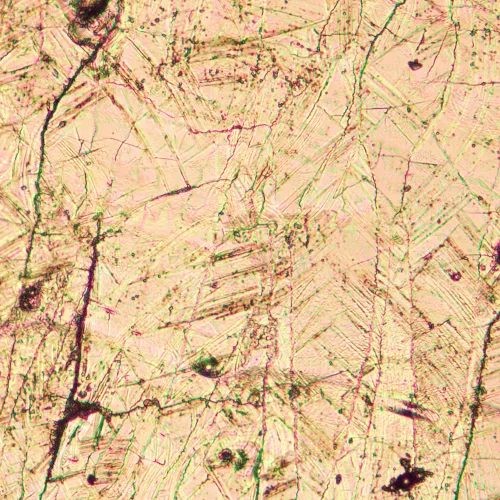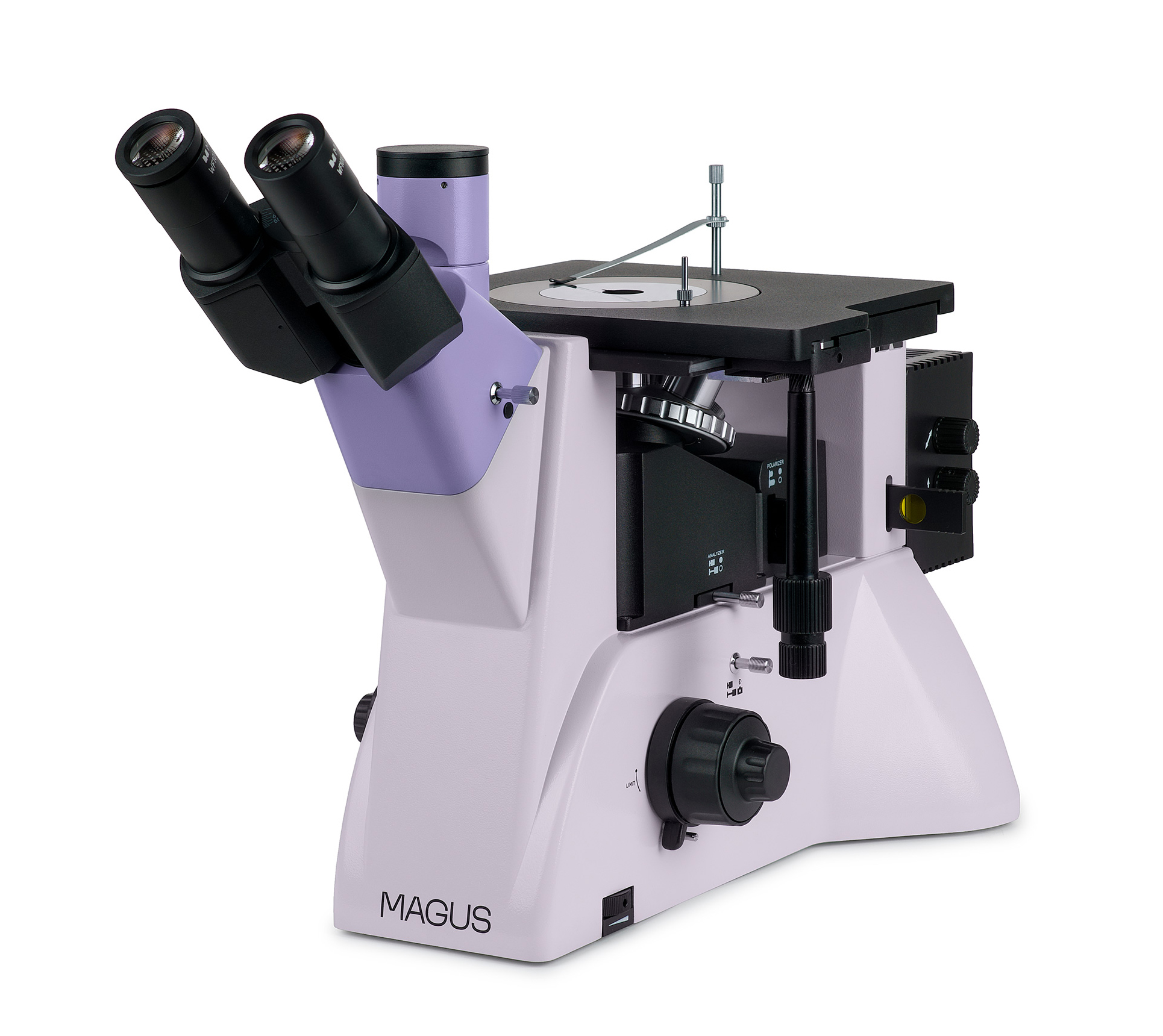MAGUS Metal V700 DIC Metallurgical Inverted Microscope
Magnification: 50–500х. Trinocular head, infinity plan achromatic objectives, 50W halogen reflected light illuminator
| Product ID | 83714 |
| Brand | MAGUS |
| Warranty | 5 years |
| EAN | 5905555021300 |
| Package size (LxWxH) | 13.8x26.8x19.3 in |
| Shipping Weight | 35.2 lb |
The microscope is designed for studying the microstructure of metals and alloys, semiconductor materials, and other opaque specimens.
The design of the inverted microscope does not limit the size of the examined sample; only its weight is limited up to 2kg. The specimen must be first specially processed, and then placed on the stage with the surface down.
The microscope implements three contrast techniques in reflected light: brightfield, simple polarization, and differential interference contrast.
The brightfield method provides an authentic magnified image of the object. Simple polarization removes glare from metal surfaces and it highlights polymers and other foreign elements. Differential interference contrast colors the height difference of an object and thereby reveals the topography of the sample. The object of study will appear in relief.
The trinocular tube and a camera side port enable the simultaneous connection of a monitor and camera.
The microscope can be used in various fields (metallurgical, engineering, aerospace, nuclear, and energy industries) as well as in research laboratories and technical universities.
Microscope head
Tube length – infinity (∞). When assembling the microscope, the user can rotate the eyepiece tubes 180° and adjust the eye relief to fit their height. There is a trinocular head.
The monitor is mounted in the trinocular tube of the trinocular head and the digital camera – in the camera side port. The light beam on the trinocular head is split 50/50 (tube is open) or 100/0 (tube is closed), on the body – 100/0 or 0/100.
Revolving nosepiece
The 5-objectives revolving nosepiece is mounted on the stand under the stage.
The revolving nosepiece has a special DIC slider slot that is used when working in the differential interference contrast method with 5x, 10x, and 20x objectives.
Objectives
Plan achromatic objectives with a long working distance that are designed for the brightfield, simple polarization, and DIC methods.
For the darkfield microscopy technique, choose the MAGUS Metal V700 BD.
Focusing mechanism
Coaxial coarse and fine focusing knobs are located at the base of the microscope on both sides. The user can place their hands on the table and take a relaxed pose while observing. The focus adjustment is smooth and effortless.
On the right, there is the coarse focusing lock knob for quick adjustments after changing the sample. On the left side, there is the focusing tension adjusting ring.
Mechanical stage
The object is moved by moving the stage along two axes. A round rotating stage plate with a hole of suitable diameter (10mm, 20mm, or 30mm) is installed in the center of the stage. A specimen holder is used to hold the object in place.
Light source
The lamphouse has a 50W halogen bulb. It is bright enough to observe with 4x to 100x objectives that are used for brightfield, polarized light, and DIC microscopy. The halogen bulb emits light with a color temperature that allows for comfortable work.
Reflected light illumination
The illumination system makes it possible to set up the Köhler illumination. The field and aperture diaphragms are pre-centered at the factory and require no additional centering. If necessary, the diaphragms can be adjusted with centering screws. The light source is centered along three axes.
The removable analyzer and polarizer are for the polarization microscopy technique. The polarizer rotates 0–360°, but the analyzer does not rotate.
The DIC prism slider is used when working by way of the differential interference contrast method with 5x, 10x, and 20x objectives.
A set of filters can help you adjust the color reproduction.
Accessories
Additional accessories increase the technical performance of the microscope. Eyepieces and objectives extend the range of magnification. Digital cameras output the image to a computer screen or monitor. Calibration slides help you take measurements of objects.
Key features:
- Suitable for studying opaque dimensional objects up to 2kg
- Trinocular head with the option to adjust eye relief
- Two independent tubes for installing a digital camera and monitor: a vertical head tube and a side tube on the body; 50/50 and 100/0 beam splitting on the trinocular head, and 100/0 and 0/100 on the body
- Powerful 50W halogen reflected light illuminator that provides bright natural light
- Köhler illumination, centered illumination system elements, simple polarization device, slot for DIC sliders
- Filters reduce the intensity of certain wavelengths and adjust the color reproduction in microscope photography
- Large-sized stage with round rotating stage plate with 10mm, 20mm, and 30mm holes
- Large selection of additional eyepieces and objectives
The kit includes:
- Stand with a power input, focusing mechanism, stage, and revolving nosepiece
- Lamphouse
- Trinocular head
- Infinity plan achromatic objective: LMPlan 5х/0.12 DIC WD 15.73mm
- Infinity plan achromatic objective: LMPlan 10х/0.25 DIC WD 20.2mm
- Infinity plan achromatic objective: LMPlan 20х/0.40 DIC WD 4.5mm
- Infinity plan achromatic objective: PL L50х/0.70 WD 3.68mm
- Eyepiece 10x/22mm with long eye relief (2 pcs.)
- C-mount adapter 1x
- DIC slider for 5x, 10x, and 20x objectives
- Hex key wrench
- AC power cord
- Dust cover
- User manual and warranty card
Available on request:
- 10x/22mm eyepiece with a scale
- 12.5x/14mm eyepiece (2 pcs.)
- 15x/15mm eyepiece (2 pcs.)
- 20x/12mm eyepiece (2 pcs.)
- 25x/9mm eyepiece (2 pcs.)
- Infinity plan achromatic objective: PL L40х/0.60 WD 3.98mm
- Infinity plan achromatic objective: PL L60x/0.70 WD 2.08mm
- Infinity plan achromatic objective: PL L80x/0.80 WD 1.25mm
- Infinity plan achromatic objective: PL L100x/0.85 (dry) WD 0.40mm
- Digital camera
- Calibration slide
| Product ID | 83714 |
| Brand | MAGUS |
| Warranty | 5 years |
| EAN | 5905555021300 |
| Package size (LxWxH) | 13.8x26.8x19.3 in |
| Shipping Weight | 35.2 lb |
| Type | light/optical, metallurgical |
| Microscope head type | trinocular |
| Head | Siedentopf, rotatable 180° |
| Head inclination angle | 45 ° |
| Magnification, x | 50 — 500 |
| Magnification, x (optional) | 50–1000/1250/1500/2000/2500 |
| Eyepiece tube diameter, in | 1.2 |
| Eyepieces | 10х/22mm, eye relief: 10mm; 10х/22mm with a scale (*optional: 10x/22mm with crosshairs, 12.5x/14; 15x/15; 20x/12; 25x/9) |
| Objectives | infinity plan achromatic: LMPlan 5x/0.12 DIC, LMPlan 10x/0.25 DIC, LMPlan 20x/0.40 DIC, PL L50x/0.70; parfocal distance 45mm (*optional: PL L40x/0.60, PL L60x/0.70, PL L80x/0.80, PL L100x/0.85 (dry)) |
| Revolving nosepiece | for 5 objectives, with DIC slot |
| Working distance, mm | 15.73 (5x); 20.2 (10x); 3.98 (40x); 2.08 (60x); 4.5 (20x); 3.68 (50x); 1.25 (80x); 0.40 (100x) |
| Interpupillary distance, in | 1.9 — 3 |
| Stage, mm | 242x200 |
| Stage moving range, mm | 30/30 |
| Stage features | round rotating stage plate Ø130mm with holes Ø10mm, Ø20mm and Ø30mm, two-axis mechanical |
| Diaphragm | built-in aperture and field |
| Focus | coaxial, coarse (with coarse focusing tension adjustment and a lock knob), and fine (0.002mm) |
| Illumination | halogen |
| Brightness adjustment | ✓ |
| Power supply | 220±22V, 50Hz |
| Light source type | 12V/50W halogen bulb, G6 |
| Light filters | blue, green, matt, yellow |
| Operating temperature range, °F | 41...+95 |
| Additional | DIC slider for 5x, 10x, and 20x objectives, removable analyzer and polarizer |
| User level | experienced users, professionals |
| Assembly and installation difficulty level | complicated |
| Application | metallurgical |
| Illumination location | lower (reflected light) |
| Research method | bright field, polarization, DIC |
| Pouch/case/bag in set | dust cover |
We have gathered answers to the most frequently asked questions to help you sort things out
Find out why studying eyes under a microscope is entertaining; how insects’ and arachnids’ eyes differ and what the best way is to observe such an interesting specimen
Read this review to learn how to observe human hair, what different hair looks like under a microscope and what magnification is required for observations
Learn what a numerical aperture is and how to choose a suitable objective lens for your microscope here
Learn what a spider looks like under microscope, when the best time is to take photos of it, how to study it properly at magnification and more interesting facts about observing insects and arachnids
This review for beginner explorers of the micro world introduces you to the optical, illuminating and mechanical parts of a microscope and their functions
Short article about Paramecium caudatum - a microorganism that is interesting to observe through any microscope

